Redefining IT | Market Insights™
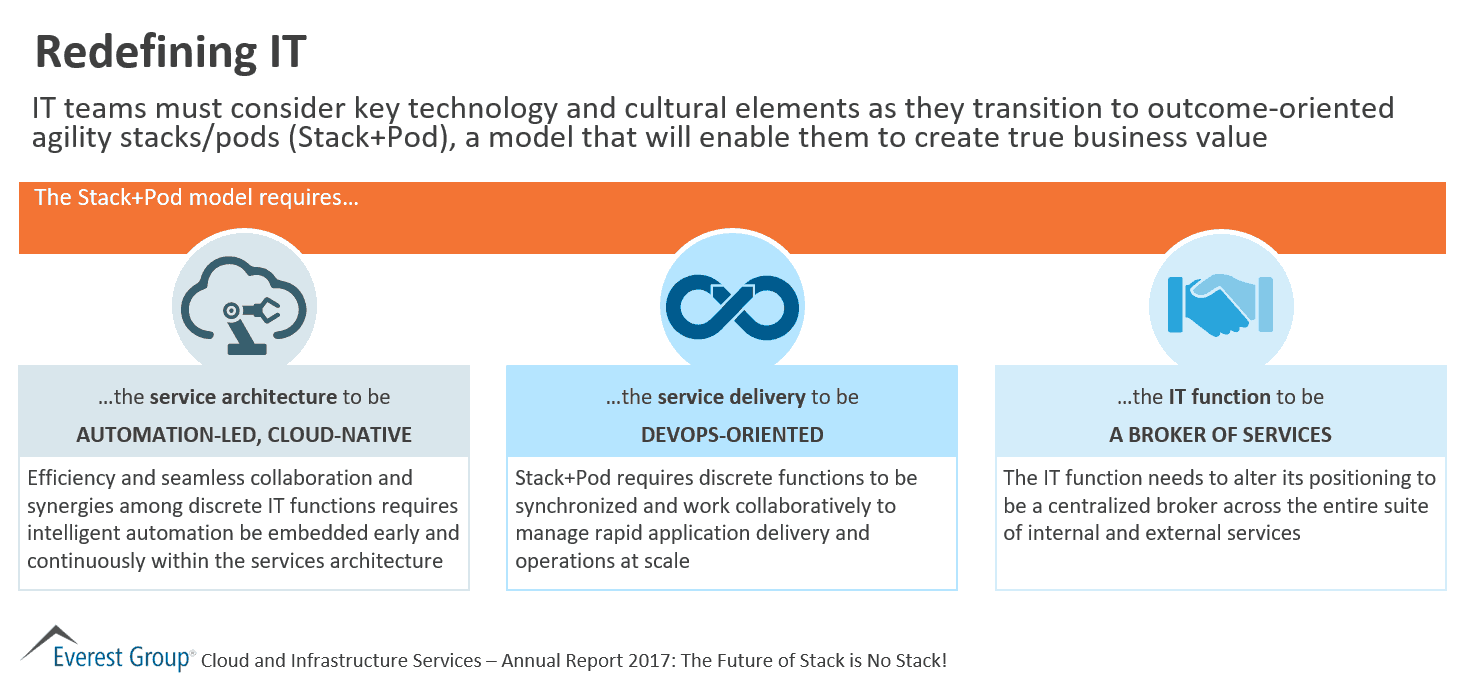
IT teams must consider key technology and cultural elements as they transition to outcome-oriented agility stacks/pods (Stack+Pod), a model that will enable them to create true business value

IT teams must consider key technology and cultural elements as they transition to outcome-oriented agility stacks/pods (Stack+Pod), a model that will enable them to create true business value
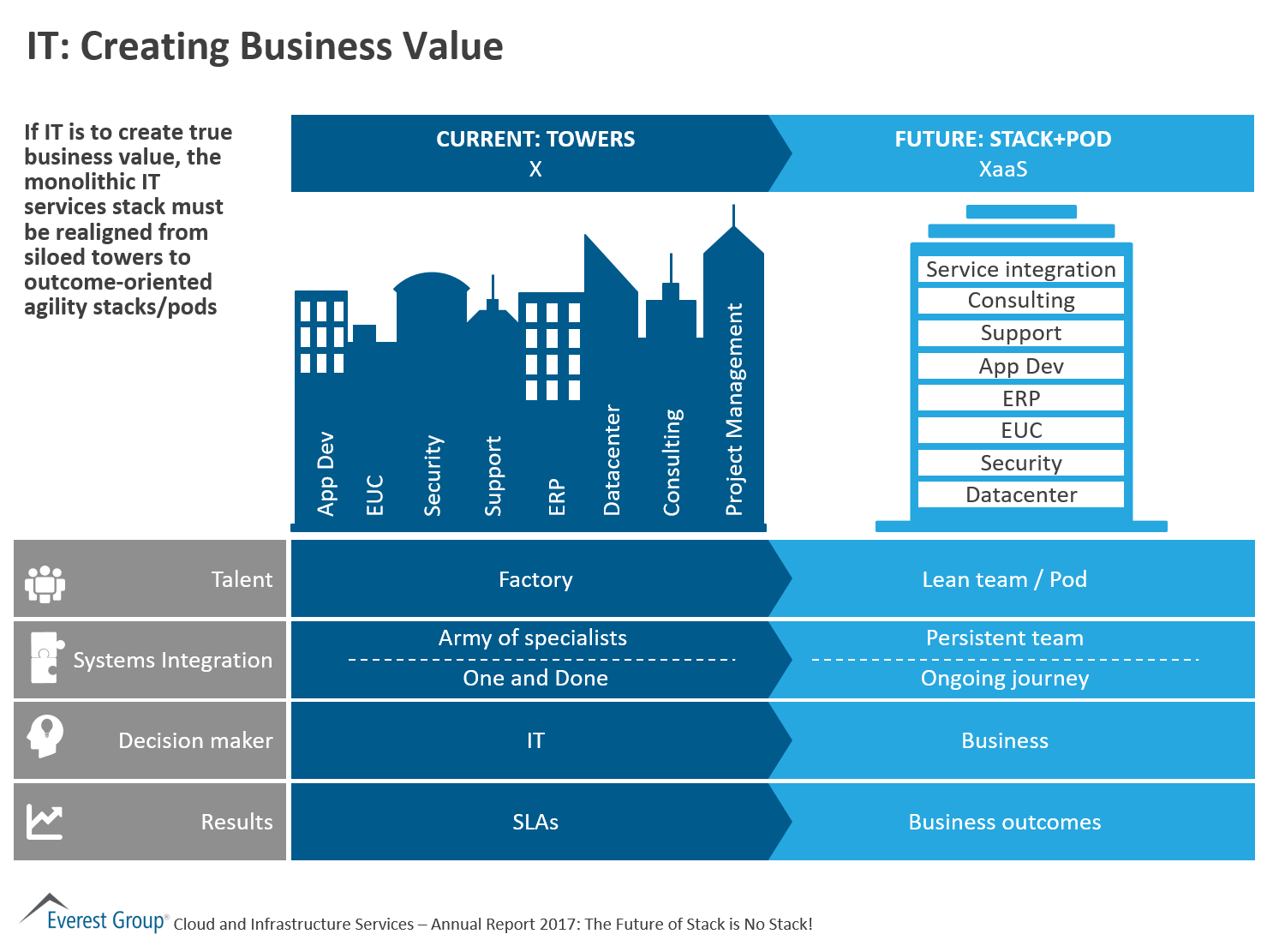
If IT is to create true business value, the monolithic IT services stack must be realigned from siloed towers to outcome-oriented agility stacks/pods
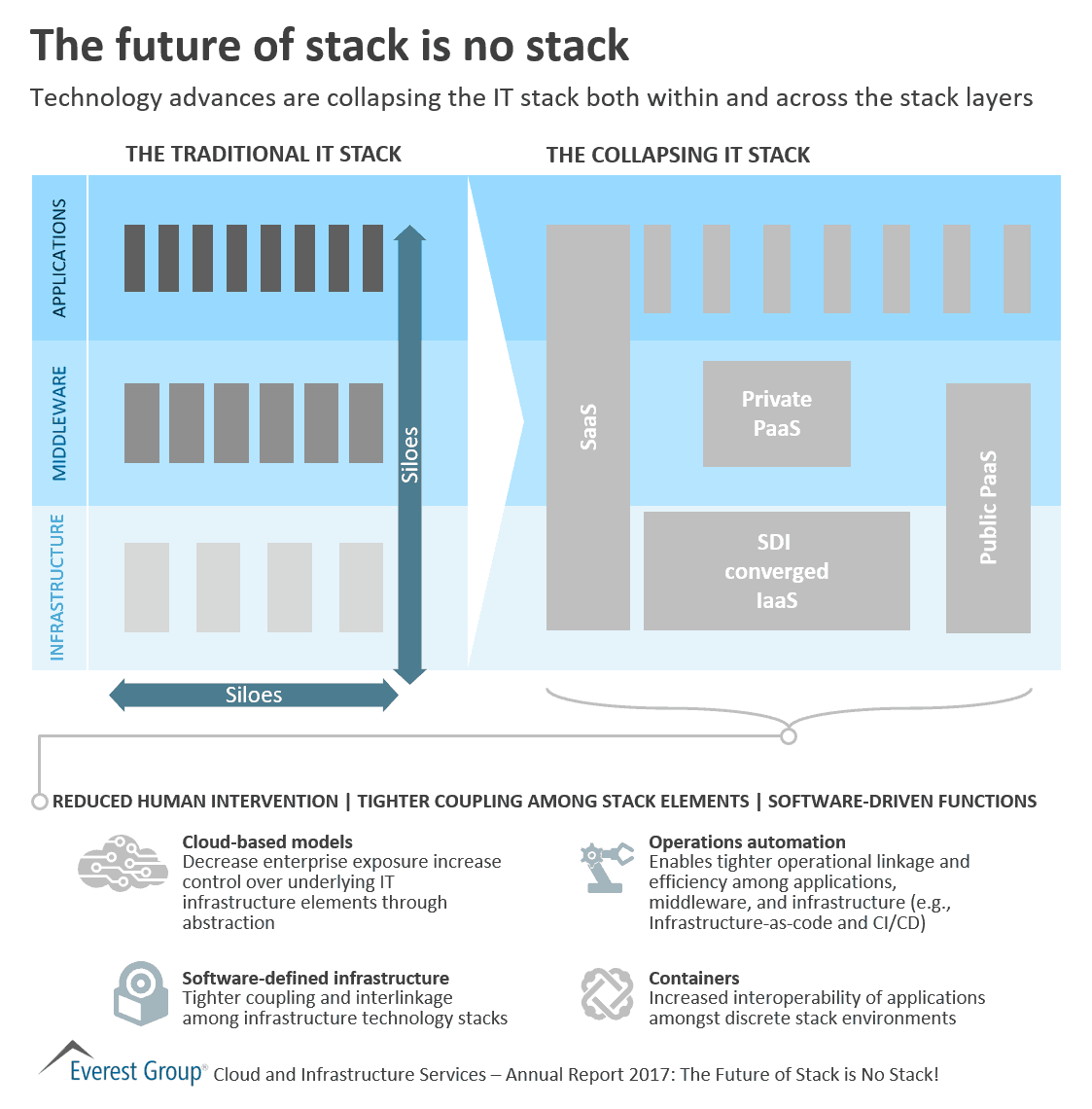
Technology advances are collapsing the IT stack both within and across the stack layers
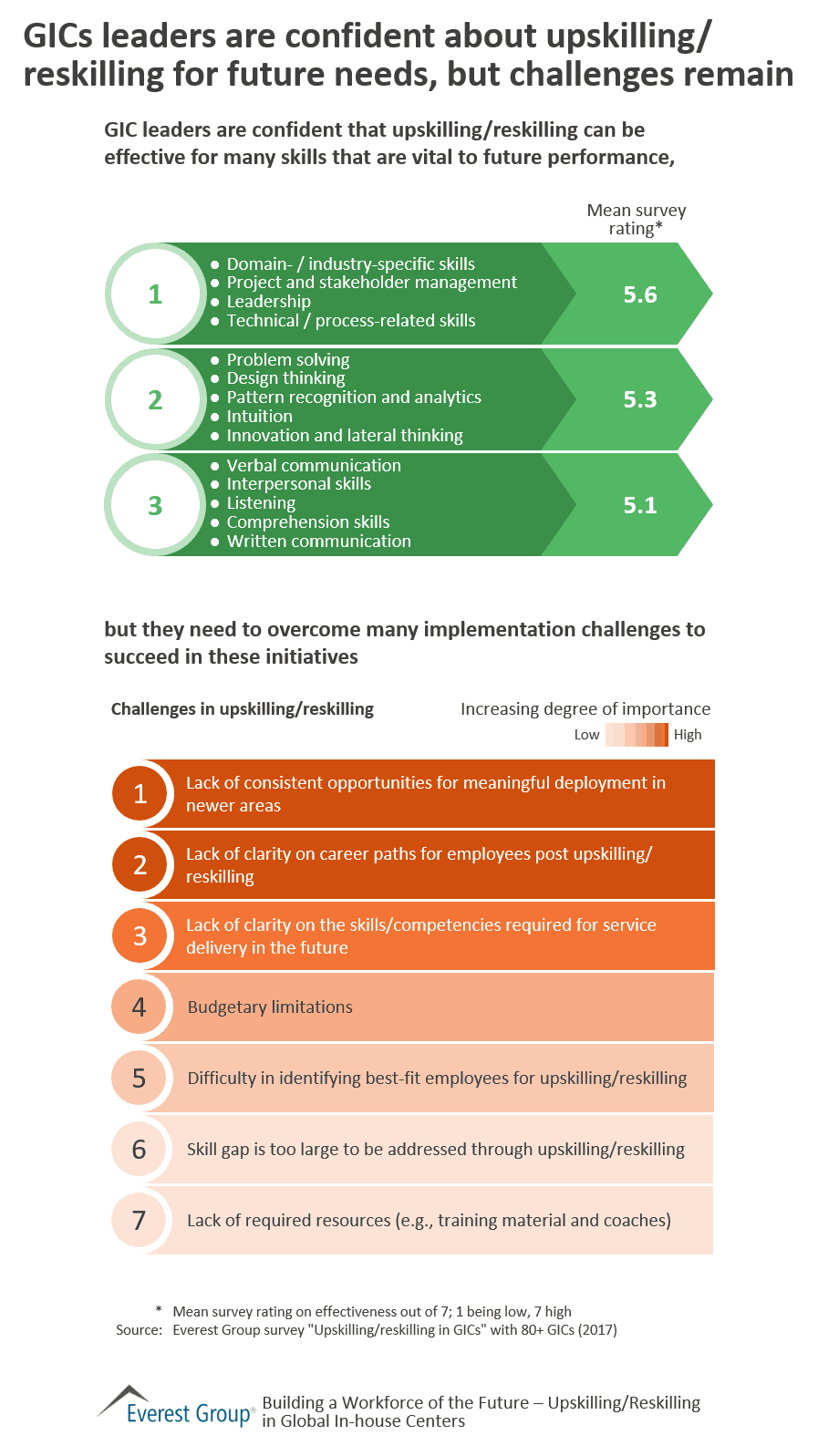
GICs leaders are confident about upskilling/reskilling for future needs, but challenges remain
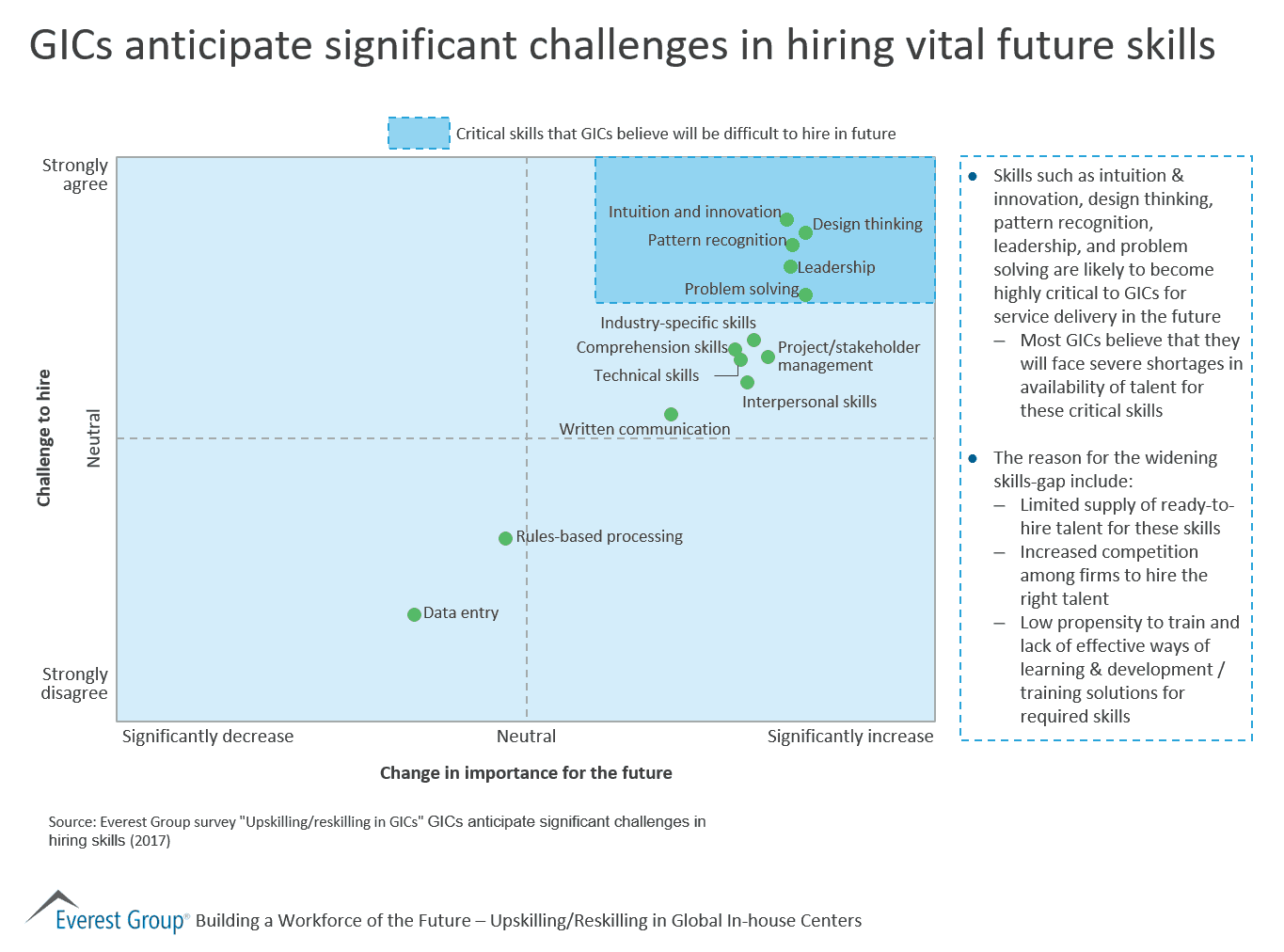
Skills such as intuition & innovation, design thinking, pattern recognition, leadership, and problem solving are likely to become highly critical to GICs for service delivery in the future
The reason for the widening skills-gap include:
The possibilities promised in taking full advantage of the new digital IT environment characterized especially by agile, DevOps, automation and cloud, are exciting. However, service providers struggle to deliver digital services at their customary profit levels, and customers aren’t prepared to buy the new digital environment because they’re stuck with their existing purchasing/contracting vehicle. So, we have two sets of constraints: Service providers don’t want to leap to the new model the customers want, but customers’ old purchasing model constrains providers from moving to the new model even if they really want to.
The top four IT companies — Tata Consultancy Services, Cognizant, Infosys and Wipro — saw a decline in revenue (in percentage terms) from the US but an increase in revenue from Europe during the December 2017 quarter, when compared with the corresponding period in the previous fiscal.
This is one of the few instances when all the four witnessed such a pattern in earnings during a quarter, said sources. The US is the biggest market for them, followed by Europe.
The decline in revenue from the US happened due to cyclical factors, said Jimit Arora, Partner at research firm Everest Group. Regulatory uncertainties in the US impacted banking and financial services and healthcare (major revenue contributing sectors), while the retail segment is undergoing cost optimisation, he said.
Indian IT services firms may see a higher number of requests for further evidence from US immigration authorities on their applications for H-1B visas, delaying the deployment of engineers on projects on work visa and increasing their cost.
Under the Trump administration’s new visa policy announced on Thursday, companies have to prove that the employees they send to the US on H-1B visas have “specific and non-speculative qualifying assignments in a speciality occupation” for the entire visa period. The memo issued by the US Citizenship and Immigration Services (USCIS) office makes it compulsory to seek evidence on the visa petitioners’ speciality occupation. This, say analysts, would increase red tape.
“We do not believe that the prospect of near-term immigration reform passing is likely. However, there is a wide range of ability to administratively change the existing regulations which will likely further restrict the large Indian firms’ use of non-US labour in their onshore model. This letter is a great example of this happening,” said Peter Bendor-Samuel, CEO of global IT research firm Everest Group. “This memo is a clear example of this current administration looking to constrain us of non ..
If I had a penny for every time Artificial Intelligence was mentioned during the recent NASSCOM India Leadership Forum, I could buy a lot of Bitcoins. Both hype and hope abound around AI and its impact on different industries’ business models.
Let’s take a look at AI the healthcare industry. Adoption is increasing, helping solve a number of problems for patients, doctors, and the industry overall. AI engines are helping doctors identify patterns in patient symptoms with data and analytics, improve diagnoses, pick the right treatments, and monitor care.
For instance, physicians can now plug diagnoses into IBM’s Watson for Oncology and receive treatment suggestions based on historical patient data and information from medical journals. Face2Gene combines facial recognition software with machine learning to identify facial dysmorphic features, helping clinicians diagnose rare genetic diseases.
Using AI to treat mental health issues is particularly fascinating. So far, AI has only been viewed as a means to help healthcare professionals provide better care. But can it eliminate a patient’s need to consult with a doctor altogether for mental health-focused moral counseling and empathetic support?
Consider this: AI engines today have the ability to listen, interpret, learn, plan, and problem solve. Early identification of mental health issues is possible through the analysis of a person’s facial features, writing patterns, tone of voice, word choice, and phrase length.
These are all decisive cues in learning what’s going on in a person’s mind, and can be used to predict or detect and monitor mental conditions such as psychosis, schizophrenia, mania, and depression.
The idea of end-to-end mental health treatment through AI with no human intervention is quite viable, and the prospect becomes even more enticing when you consider how the following factors could drive acceptance among patients:
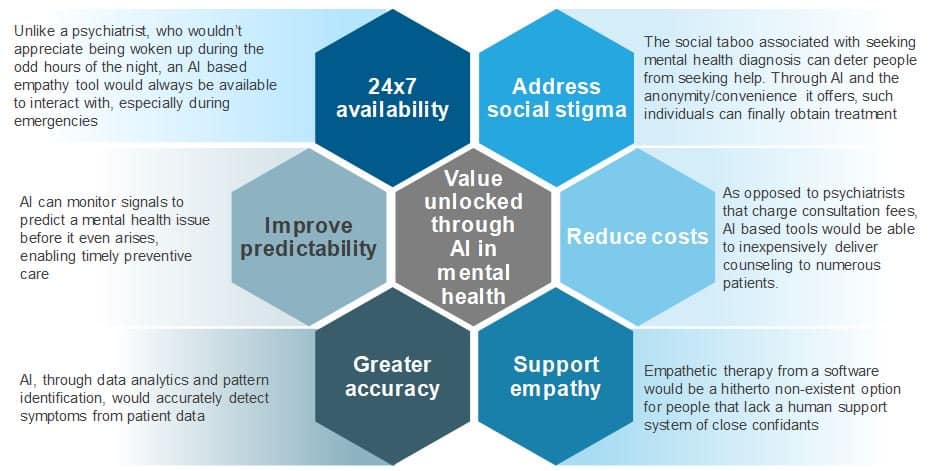 Thus, it’s not surprising that a few players have already begun to delve into this space. Woebot is a software chatbot that delivers a mood management program based on Cognitive Behavior Therapy (CBT). AI luminary Andrew Ng is on the company’s board of directors. Randomized controlled trials at Stanford University have shown that Woebot can help reduce symptoms of depression and anxiety in two weeks.
Thus, it’s not surprising that a few players have already begun to delve into this space. Woebot is a software chatbot that delivers a mood management program based on Cognitive Behavior Therapy (CBT). AI luminary Andrew Ng is on the company’s board of directors. Randomized controlled trials at Stanford University have shown that Woebot can help reduce symptoms of depression and anxiety in two weeks.
 Another example is Tess, a psychological AI that communicates via text, administers highly personalized psychotherapy, psycho-education, and delivers on-demand health-related reminders, when and where a mental health professional isn’t available. It can hold conversations with the patient through a variety of existing technology-based communications, including SMS, WhatsApp, and web browsers. More recently, Facebook started using AI to help predict when users may be suicidal.
Another example is Tess, a psychological AI that communicates via text, administers highly personalized psychotherapy, psycho-education, and delivers on-demand health-related reminders, when and where a mental health professional isn’t available. It can hold conversations with the patient through a variety of existing technology-based communications, including SMS, WhatsApp, and web browsers. More recently, Facebook started using AI to help predict when users may be suicidal.
There are even cases of highly specialized products:
While the hype crowd might have you believe that your next appointment will be with a droid, several open questions warrant healthy skepticism of mainstream AI adoption in mental healthcare:
The ecosystem is trying to solve for these and other questions. While it might be too early to say that AI-based mental health treatment options can become mainstream currency, they clearly create significant value. As healthcare organizations and patients experiment with these use cases, there’s a sizable opportunity to reimagine the workflow and treatment paradigm.
In August 2016, Everest Group published an analysis of hot digital health startups that were disrupting the status quo of the industry landscape. It ended becoming a unicorn-spotting analysis…cut to February 2018, and by healthcare and life sciences organizations have acquired three — Flatiron Health, NantHealth, Practice Fusion — and among the top 25 players. While we speak, there are multiple conversations around the others as investor interest peaks.
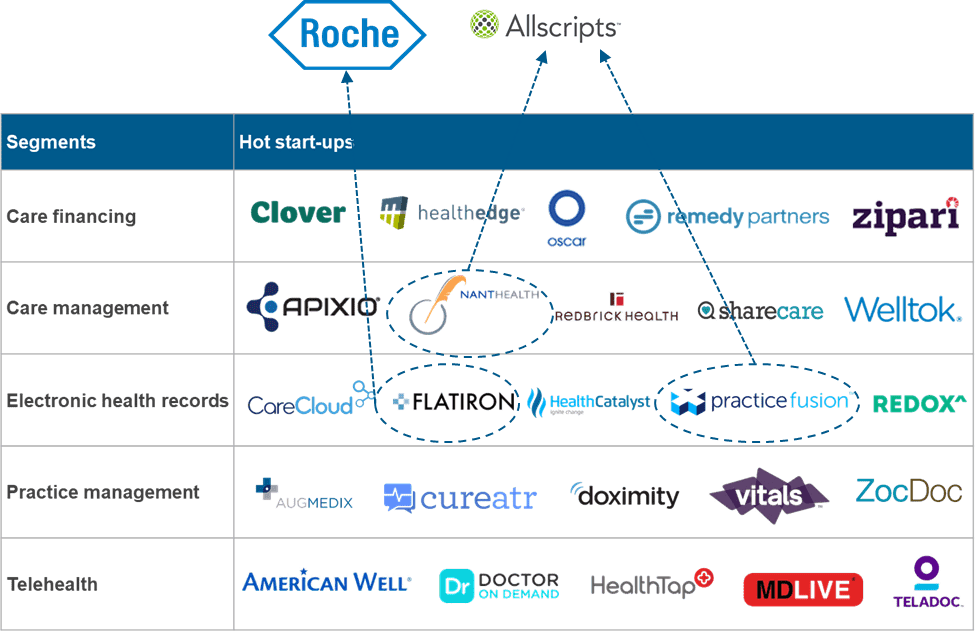
What are the key business reasons behind these three acquisitions?
Here’s what is common among these recent acquisitions:
At a broader industry level, these acquisitions mirror the change in sentiment around digital initiatives. Our research shows signs that enterprises are moving beyond proof of concept to proof of value. While digital, as a market, lends itself to smaller deals with focuses on design thinking, first principles problem solving, and business model redesign, we see these initiatives now scaling up.
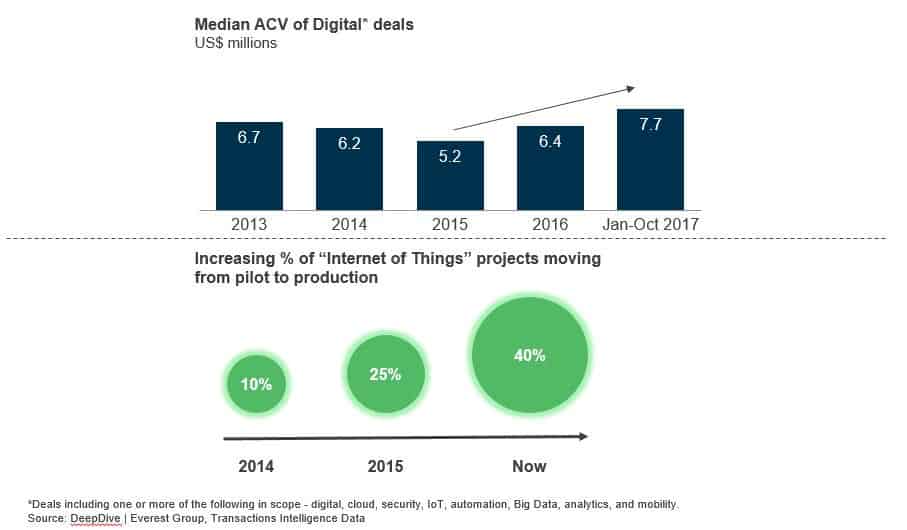
As the digital marketplace matures, investment activity is only going to intensify. While early adopters are reaping rich rewards, valuations and competition for viable targets are likely to skyrocket. It’s clear that healthcare enterprises see significant business value, and are willing to put their money where their mouth is. Stay tuned to this space for more analysis of what’s happening in the healthcare and digital spaces.

©2023 Everest Global, Inc. Privacy Notice Terms of Use Do Not Sell My Information
"*" indicates required fields